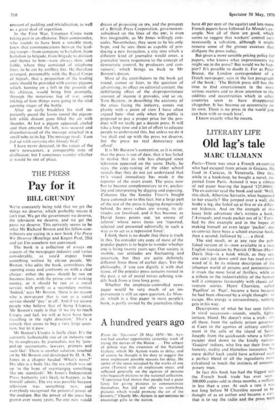THE PRESS
Pay for it
BILL GRUNDY
We're constantly being told that we get the things we deserve, which probably means it isn't true. We get the government we deserve, the television we deserve, and we get the press we deserve. This certainly seems to be what Mr Richard Boston and his fellow-con- tributors are saying in a new book The Press We Deserve (Routlege and Kegan Paul, 35s) and yet I'm somehow not convinced.
The book is a collection of essays on aspects of the newspaper industry and varies considerably, as you'd expect from something written by eleven people. Mr Boston, who edits the book, contributes the opening essay and confronts us with a clear choice: either the press should he run on business lines, with the prime aim of making money, or it should be run as a social service, with profit as a secondary motive.. 'Indeed,' says Mr Boston. 'there is no reason why a newspaper that is run as a social service should "pay" at all'. And if we accuse people who believe that of being Utopian, Mr Boston's reply is that 'if we try to reach Utopia and fail, we will at least have been travelling in the right direction.' That's a remark that seems to beg a very large ques- tion, but let it pass.
Mr Boston's Utopia is fairly clear. It's the currently fashionable one of an industry run by its employees, by journalists, not by 'jum- ped-up accountants, lawyers, printers and such like'. There is another solution, touched on by Mr Boston and developed by D. A. N. Jones in a chapter headed 'What's news?' His idea is a body like the !TA which was set up 'in the hope of maintahling something like BBC standards'. Mr Jones's Independent Press Authority isn't likely to happen, as he himself admits. The rra was possible because television was something new, and everybody recognised the potential power of the medium. But the power of the press has grown over many years. No one now would dream of proposing an IPA, and the prospect of a British Press Corporation, government- subsidised on the lines of the sac, is even less imaginable, as Mr Jones willingly con- cedes. Nevertheless, they seem to be his only hope, and he sees them as capable of pro- ducing a new Jerusalem, a city into which a different kind of journalist would enter, a journalist 'more responsive to the concept of democratic control, by producers and con- sumers', which brings us back to Mr Boston's dream.
Most of the contributors to the book get round, sooner or later, to the question of advertising, its effect on editorial content, the debilitating effect of the disproportionate amount of income it provides, and so on. Tom Baistow, in describing the anatomy of the crisis facing the industry, comes out plainly with a point of view I have often argued here—that only when the public is prepared to pay a proper price for the pro- duct will we really get a decent press. It will take a long time and a lot of effort to educate people to understand this, but unless we do it 'we shall end up with the press we deserve, but the press no real democracy can afford'.
It is Mr Baistow's contention, as it is mine, that the press is out of date, that it has failed to realise that its role has changed since television appeared on the scene. Daily, he says, the copy-tasting of the older school reveals that they do not yet understand that 'rv's visual immediacy has made it the reporter of the overt event. The press now has to become complementary to Tv, analys- ing and interpreting by digging and exposing. Columns like the Sunday Times's Insight have cottoned on to this fact, but a large part of the rest of the press is lagging dangerously behind. Its news values are wrong, its at- titudes are fossilised, and it has become, as David Jones points out, 'an enemy of reform' whose news items are 'reported, selected and presented editorially in such a way as to act as a repressive force'.
I think there is no doubt that there is truth in this. To consider any copy of most of the popular papers is to begin to wonder whether one is living twenty years ago. Our society is mobile, our attitudes are fluctuating and uncertain, but they are quite definitely different from those of earlier days. Yet-the philosophy, if you can dignify it with that name, of the popular press remains rooted in the past. a set of moral noises echoing win- dily back from a time long gone.
Whether the employee-controlled news- paper would be very much of art im- provement is still an open question. Le Mon- de, which is a fine paper in most people's book, is partly owned by the journalists (they
have 40 per cent of the equity) and lots more French papers have followed Le Monde's ex- ample. Not all of them are good, which seems to suggest that workers' control isn't necessarily a salvation, although it might remove some of the grosser excesses that disfigure the press today.
But given a more sensible pricing policy for papers, who knows what improvements we might see in the press? But would we be hap- Pier? It's possible to doubt it. For as Peter Brusse, the London correspondent of a Dutch newspaper, says in the last paragraph of the book : 'The British press still has the time to find entertainment in the most serious matters and to draw attention to the oddities and eccentricities which in other countries seem to have disappeared altogether. It has become an eccentricity on its own. There is no press in the world you can hate with so much love'.
I know exactly what he means.


































 Previous page
Previous page